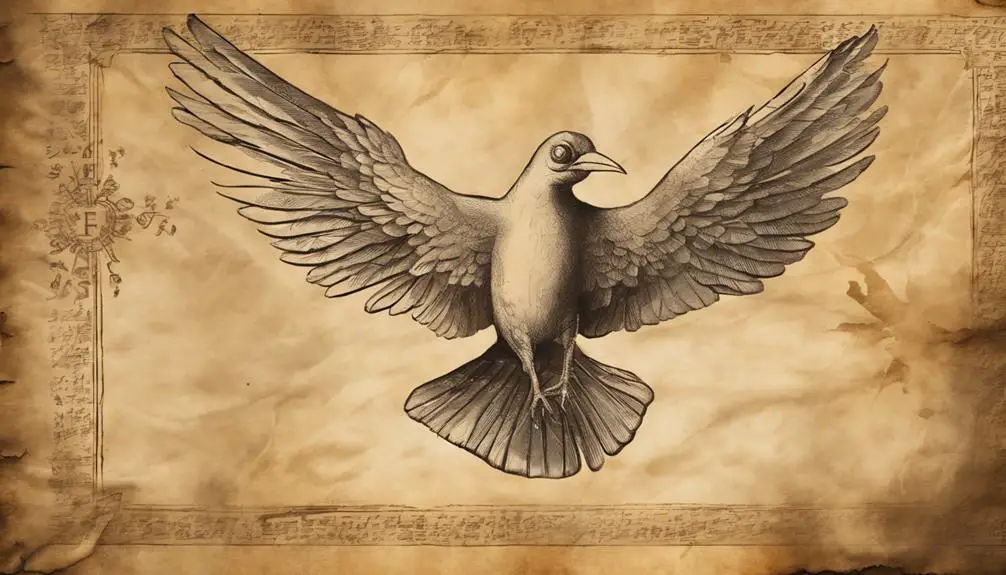Knead into the mystery of 'ossifrage' in the Bible and discover its unexpected symbolic significance.

Ossifrage in the Bible
Imagine you're flipping through the pages of your Bible and you stumble upon the term 'ossifrage'. It's mentioned in Leviticus and Deuteronomy as a creature that Israelites were forbidden to eat, but what exactly is an ossifrage?
Is it significant beyond being a part of ancient dietary laws? As we venture into this intriguing topic, you'll find that the ossifrage holds more symbolic weight than you might initially think.
Let's delve deeper into the symbolic significance of the ossifrage and explore its cultural and historical contexts.
Key Takeaways
- The ossifrage, a bone-crushing bird, symbolizes strength, power, and spiritual ascent in biblical texts.
- It is a prohibited food in Leviticus and Deuteronomy, symbolizing obedience and ritual purity for the Israelites.
- Misinterpretation of the ossifrage's biblical symbolism can lead to inaccurate theological conclusions.
- Modern interpretations of the ossifrage vary, adding complexity to its role in religious texts.
Understanding the Term 'Ossifrage

To fully grasp the biblical context, you'll first need to understand the term 'ossifrage', a somewhat obscure reference in modern times. The ossifrage etymology stems from the Old French 'os' meaning 'bone,' and 'fracture,' to break. Hence, 'ossifrage' translates to 'bone-breaker', a fitting name considering the species' peculiar feeding habits.
Diving into the ossifrage species, you'll find that it's a large bird of prey, specifically a type of vulture. More commonly known as the bearded vulture or lammergeier, it's renowned for its unique and quite literally bone-crushing diet. Unlike most vultures that feast on the flesh of dead animals, the ossifrage prefers the marrow within the bones. They'll drop large bones from great heights onto rocks to shatter them and access the marrow inside.
Recognizing the ossifrage's etymology and species characteristics is essential in grasping its biblical significance. The term 'ossifrage' in the Bible isn't a random bird reference, but a metaphorical embodiment of certain attributes and behaviors. However, we'll delve into the biblical references and their implications in a later discussion. For now, understanding the ossifrage's identity is your key to unlocking these deeper biblical insights.
Biblical References to Ossifrage

Often, you'll come across references to the ossifrage in biblical texts, each bearing significant metaphorical implications reflecting the bird's unique characteristics. Its depiction is mostly symbolic, yet these symbols often lead to misinterpretations.
To give you a clearer view, let's break down the most common 'Ossifrage Depictions' found in the Bible:
- The ossifrage is frequently used as a symbol of strength and power. This is due to its impressive size and predatory nature.
- It's also used metaphorically to represent isolation or solitude. The ossifrage is known to live in high, remote regions, often away from other species.
- Lastly, some texts utilize the bird as a symbol of destruction or the end of a cycle, correlating with its role as a scavenger in the ecosystem.
However, it's important to highlight some common 'Ossifrage Misinterpretations'. Often, people confuse the ossifrage with other birds of prey mentioned in the Bible, leading to inaccurate interpretations. Additionally, its depiction has sometimes been misinterpreted as negative due to its scavenging behavior, when in reality, it's an essential part of the ecosystem. Understanding these nuances in biblical symbolism can enrich your interpretation of these ancient texts.
Ossifrage Within Dietary Laws

Shifting our focus from symbolism to practical regulations, it's essential to recognize the role of the ossifrage within biblical dietary laws. Now, you might wonder about ossifrage consumption, but here's the catch – the Bible, specifically in Leviticus 11:13 and Deuteronomy 14:12, prohibits it. Yes, the ossifrage, or bearded vulture as it's known today, was considered an 'unclean' bird, unfit for consumption by the Israelites.
This prohibition wasn't arbitrary. It had a significant dietary impact, shaping the eating habits and food culture of ancient Israel. The dietary laws were designed to set the Israelites apart, distinguishing them from neighboring cultures, and the ossifrage was part of that distinction.
While modern scientific understanding might make you question the dietary impact of not consuming ossifrage, it goes beyond mere nutrition. It's about obedience to divine commandments, maintaining ritual purity, and expressing one's identity as an adherent of the faith. So, the next time you come across the term 'ossifrage' in your biblical studies, remember, it's not just a bird; it's a representation of a culture, a faith, and a way of life.
Symbolism of the Ossifrage

Delving deeper into the symbolism of the ossifrage, you'll find that this bird holds a profound significance in biblical text, far beyond its role in dietary laws. Its presence in the Scripture isn't merely incidental, but conveys powerful spiritual messages.
- Ossifrage's Strength: The ossifrage, known for its incredible strength, is often used as a symbol of power and resilience. Just as the bird skillfully navigates through harsh environments, it signifies the ability to withstand life's adversities and come out victorious.
- Ossifrage's Habitat: Ossifrage's habitat, typically high in the mountains, also holds symbolic meaning. The bird's preference for high altitudes is seen as a metaphor for spiritual ascent and closeness to the divine.
- Ossifrage and Purity: Despite its seemingly harsh nature, the ossifrage is also associated with purity. This comes from the biblical dietary law which deems it unclean for consumption, suggesting a level of sanctity.
Through these symbolic associations, you can appreciate how the ossifrage's strength and habitat, along with its purity, are used to convey deep spiritual truths. The symbolism of the ossifrage thus extends far beyond a mere bird, representing deeper biblical teachings and spiritual insights.
Ossifrage in Modern Interpretation

In today's context, the ossifrage's symbolism can be interpreted in numerous ways, depending on one's religious and cultural perspectives. This bird, noted for its power and might in the biblical era, continues to hold sway in modern interpretations. The ossifrage's cultural impact is significant, viewed in some cultures as a symbol of power, freedom, and spiritual insight. Its imposing image is often used in literature and art to convey these themes.
However, there are interpretive challenges of the ossifrage. Its symbolism isn't universally accepted, leading to a myriad of interpretations across different cultures and religions. For instance, while some see the bird as a symbol of strength and freedom, others associate it with death and destruction due to its scavenging nature.
Moreover, the ossifrage's role in religious texts like the Bible adds another layer of complexity to its interpretation. It's seen as a 'clean' bird, yet it's also associated with the process of cleansing and purifying. Deciphering these conflicting symbols can be challenging, but it's these complexities that make the ossifrage a fascinating subject in modern interpretation.
Frequently Asked Questions
What Is the Scientific Name of the Bird Referred to as 'Ossifrage' in the Bible?
You're asking about the scientific name of the bird known as 'ossifrage.' It's called Gypaetus barbatus, or the bearded vulture.
It's fascinating because its diet is primarily bones, hence the name ossifrage, meaning bone-breaker. Its habitat ranges from mountainous regions in Europe, Africa, and Asia.
It's a unique bird, both in dietary habits and living conditions.
Are There Any Specific Stories or Parables in the Bible That Prominently Feature the Ossifrage?
You're curious if the ossifrage features prominently in any biblical tales or parables. While it's mentioned in the context of dietary laws, it doesn't play a starring role in any specific stories.
The ossifrage's symbolism in the Bible is tied to its status as an unclean bird due to its diet. It's a scavenger, feeding on carrion, and thus, it's seen as a creature of impurity.
Are There Any Other Ancient Texts or Religions That Mention the Ossifrage?
You're curious about other ancient texts or religions mentioning the ossifrage. Well, it's sparse. Ossifrage, a type of vulture, doesn't pop up often in mythology. It's not a common symbol like the phoenix or raven.
But, don't be disheartened. There's a vast world of ancient texts and religions. Keep digging and you might uncover something unexpected. Just remember, not every creature holds the same symbolic weight in every culture.
How Was the Ossifrage Typically Depicted in Biblical or Historical Artwork?
You're curious about ossifrage symbolism in biblical or historical artwork. Usually, it's represented as a large, powerful bird, denoting strength and tenacity.
This stems from its role in Biblical imagery, where it's seen as a cleanser of the earth due to its scavenging habits.
It's not often depicted, but when it is, it's typically in a commanding, dignified pose, emphasizing its status as a creature of significant symbolic meaning.
Has the Interpretation or Understanding of the Ossifrage's Symbolism Changed Significantly Over Time?
Yes, your understanding of the Ossifrage's symbolism has likely shifted over time.
In early interpretations, you might've seen it as a symbol of purification due to its diet. However, as perspectives evolved, you've probably encountered differing views.
The Ossifrage's interpretation evolution reflects changes in societal values and beliefs. This is common with symbolism; its meaning can be fluid, adjusting to each era's unique perspectives and understandings.
Conclusion
You've journeyed through the term 'ossifrage', seeing its Biblical references, dietary laws, symbolism, and modern interpretations. It's clear that this bird, often identified as a vulture or eagle, holds significant meaning in biblical context. Its depiction as 'unclean' underlines important dietary restrictions, and its symbolic value offers deeper insights.
Understanding the ossifrage enriches your appreciation of Biblical text, revealing nuances that might otherwise be overlooked. Always remember, every word has a story.



Sign up